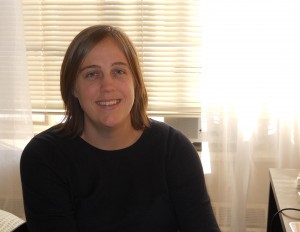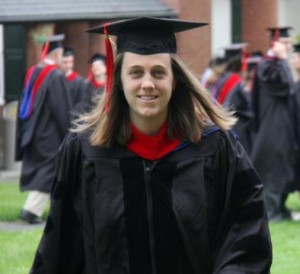Below is a reflection written by 2012 Workin Scholar Rebecca Seely on the piece “New Beginnings” by Joel R. Workin:
I was 16 and I thought I knew everything. Well, I thought so until the day that driving home from play practice, I had a revelation. I was a lesbian. It felt like it came out of nowhere. It was scary and it was awesome. This elemental piece of who I was had been there for years—hiding out and then popping up for brief glimpses—but I didn’t recognize myself as fully me until that moment on the interstate. As I tightly gripped the wheel of my sister’s car, the world began anew for me and I came to know myself for the first time. I was still the same me but the whole landscape of my life had shifted. I didn’t know how to proceed, who to tell or what to do. I was scared but I was happier than I’d ever been just being me.
As my eyes opened to who I was, they also opened to the injustice all around me. I became active in anti-oppression work after that—organizing in my high school, local community and college to combat sexism, racism, classism and homophobia. I fought to celebrate National Coming Out Day for the first time in my conservative high school and became a counselor at an anti-oppression summer camp. Although I wasn’t thinking in the Christian framework that Joel Workin uses, I was trying—as he urges—to share the light with others.
My coming out to family and friends went pretty smoothly and I felt lucky to experience so much acceptance. As a result, I became particularly concerned about the plight LGBTQ youth whose families and communities do not support them. During this time in high school when I was fighting so fervently to bring about justice for LTBGQ people—and for all people—my biggest opponents were Christians. The kids in my high school who tore down posters for my LGBTQ group defended their actions on Christian grounds. The bigots I heard talking on television and the radio invoked the Bible to defend their actions. And it wasn’t just queer issues—I saw the way the segregation of churches, the second-class citizenship of women in many denominations, the willful ignorance of so many people of faith and I thought, Christianity is so hateful. I hate it.
At 21, I once again thought I had it all figured out. I had read a lot of post-modern theory, attended a hundred rallies and intentional queer community meetings and just knew that religion was the opiate of the masses and the tool of the oppressor. It was that year that I had my own Damascus experience. In my “Great Books” major, we were assigned to read the Bible and classic Christian theology. I did it grudgingly but over the semester, something shifted for me. God shifted me. It happened gradually—so gradually that I didn’t know to try to fight it. One afternoon, in the shadowy college library basement, the light broke in. Reading about Jesus, I thought to myself, I believe this. I believe this crazy, amazing story. Everything I thought I knew about Christianity, about God, began to change, to become clearer. And Jesus Christ wasn’t opposed to justice—he is the one bearing the light. The dichotomy fell apart. The prison bars around my heart were opened. More fully myself than ever, I began anew in faith.
Even when they have been hard, the new beginnings in my life have been profoundly liberating experiences. When we are able to be open to the unpredictable ways God is working in our lives and in the world, we come to know ourselves better as God’s beloved creatures. In my life, I have experienced so viscerally that God loves me and wants to liberate me from the chains I put myself in and that society puts me in. This love makes me so grateful. It makes me love myself. And this love makes me want to help those who have been told they are unlovable open themselves up to being love—by God and by themselves.
The church needs to be part of this, to embrace new beginnings. It needs to come to be more itself by changing, to live out Jesus’ love for all people, whoever God made them to be. This requires institutional change now and a willingness to change in the future. But the church is more than an institution—it is a living breathing body comprised many living, breathing souls. My soul and your soul and the souls of our friends and seeming enemies all need new beginnings too. And we give them to each other and to ourselves not only through fighting the big institutional fights, but also by seeking to rediscover one another in our wholeness. I feel called to make space for people to be able to tell their stories to one another and hear one another—to rediscover themselves and God in one another and then to welcome one another in our newness. The congregation I hope to pastor, the LGBTQ youth group I hope to run—these will be just some of the places where I hope people will be able to experience God’s love for them and then go out and share the light with others.
 At the beginning of this reflection, I wrote about my coming out story and my conversion story. In many ways, they are the same story. It is the story of new beginnings. There is a false dichotomy between religious and secular, between conversion stories and every other story of the world God is constantly creating anew. It is scary to wake each morning and not know where God will take us or what God will ask of us. But inside the new beginnings to which we open ourselves, there is also the amazing promise that God who loves us will help us more fully know and love ourselves and one another. We are called to live a life of humble awe, remembering always that each of us is fearfully and wonderfully made. Any and all change we seek in the church and the world must start from that foundation. Any and all prophetic ministry must be rooted in openness and love. That is what will change our world.
At the beginning of this reflection, I wrote about my coming out story and my conversion story. In many ways, they are the same story. It is the story of new beginnings. There is a false dichotomy between religious and secular, between conversion stories and every other story of the world God is constantly creating anew. It is scary to wake each morning and not know where God will take us or what God will ask of us. But inside the new beginnings to which we open ourselves, there is also the amazing promise that God who loves us will help us more fully know and love ourselves and one another. We are called to live a life of humble awe, remembering always that each of us is fearfully and wonderfully made. Any and all change we seek in the church and the world must start from that foundation. Any and all prophetic ministry must be rooted in openness and love. That is what will change our world.
Rebecca Seely graduated in 2012 from Yale Divinity School in New Haven, Connecticut. She will be fulfilling her Lutheran Year at Pacific Lutheran Theological Seminary next year.
